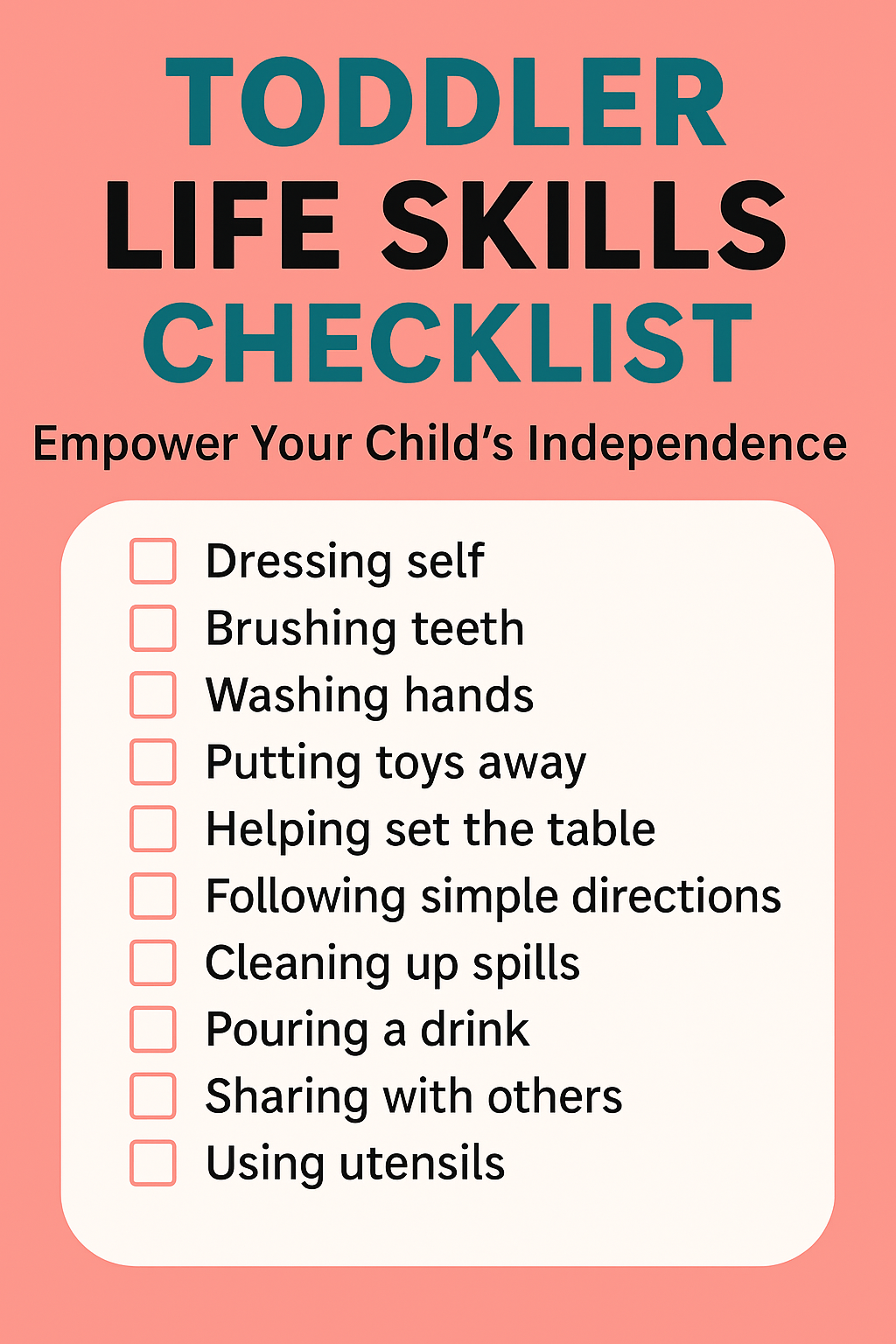Toddler Life Skills Checklist: Help Your Child Build Independence
Raising a toddler means constant learning — for both of you. A solid toddler life skills checklist can help you track progress, build independence, and create structure in your day.
One minute they’re melting down over the wrong color sippy cup, and the next they’re proudly putting their socks on all by themselves.
If you’re a parent trying to nurture independence without chaos, this toddler life skills checklist is your new best friend.
In this post, you’ll discover essential toddler life skills every young child should learn, practical ways to teach them, and a printable checklist to keep you on track.
From putting on shoes to following simple instructions, these milestones are stepping stones to a confident, capable child.
Heads up: This post may include affiliate links. As an Amazon Associate, I earn from qualifying purchases—at no extra cost to you. Full privacy policy and disclosure here.

Why Toddler Life Skills Matter
Life skills are everyday tasks that help children grow into independent, responsible, and confident individuals. For toddlers, this isn’t about perfection — it’s about practice. Teaching life skills early builds:
- Self-esteem – kids feel proud when they can do things on their own
- Independence – learning how to care for themselves reduces frustration
- Resilience – they’re more willing to try, fail, and try again
- Connection – completing tasks with you creates bonding moments
These foundational life skills will serve your toddler not just now, but throughout childhood.
Toddler Life Skills Checklist: The Ultimate Guide to Early Independence
Here are key toddler life skills grouped by category, along with tips for teaching each one.
🧼 Personal Care
- Washing hands
- Brushing teeth with help
- Wiping nose with tissue
- Dressing with minimal assistance
- Putting dirty clothes in the laundry
- Using the toilet or signaling when they need to go
Try a visual chart like the Melissa & Doug Magnetic Responsibility Chart to track daily personal care routines.
🧺 Household Skills
- Cleaning up toys
- Wiping spills
- Putting dishes in the sink
- Helping sort laundry
- Feeding pets with supervision
These chores build responsibility. Start small — even a toddler can use a child-size broom set to help sweep.
🍎 Mealtime Skills
- Using a spoon and fork
- Drinking from an open cup
- Pouring from a small pitcher
- Helping set the table
- Cleaning up after meals
Meal prep is a perfect time to talk about routines, manners, and cooperation.
Pro Tip: A toddler-safe kitchen helper stool lets them safely reach the counter to help with snacks.
🎒 Communication and Social Skills
- Making eye contact
- Saying please and thank you
- Using words to express emotions
- Asking for help
- Taking turns during play
Books like “Hands Are Not for Hitting” are excellent for teaching gentle communication.
🧠 Cognitive and Emotional Skills
- Following simple 1-2 step instructions
- Naming basic emotions
- Problem-solving (e.g., asking for help, trying again)
- Playing independently for short periods
Support emotional development with low-stimulation content like those listed in 24 Best Low Stimulation Shows for Toddlers.
Each time you encourage your toddler to complete a task from the toddler life skills checklist, you’re reinforcing independence.
How to Teach Toddler Life Skills (Without Losing Your Mind)
- Model first – Show them how to complete a task, slowly and clearly.
- Break it down – Toddlers need small, manageable steps.
- Make it fun – Turn tasks into games or songs.
- Use routines – Repetition helps toddlers learn what comes next.
- Celebrate effort – Praise the attempt, not just the outcome.
Your toddler won’t fold laundry like Martha Stewart — and that’s okay. The goal is growth, not perfection.
“Can you put your socks in the basket? High five! You’re helping like a big kid.”
Printable Toddler Life Skills Checklist
Want to track your toddler’s progress? Download this pretty purple printable checklist to stick on your fridge or playroom wall.
It’s fun, visual, and helps reinforce consistency in your routines.
Common Challenges — And How to Handle Them
Bedtime Battles
Is your toddler suddenly stalling before bed? Check out Toddler Stalling Bedtime? Try These Quick Solutions to keep your evening routine on track.
Safety Struggles
If your child bolts out of the stroller or struggles with transitions, this post on How to Keep Your Child from Bolting Out of the Stroller is a must-read.
Power Struggles
Tired of yelling? Learn gentle, effective tips from How to Get Your Toddler to Listen Without Yelling.
Recommended Tools to Support Life Skills Development
- Melissa & Doug Basic Skills Board – Practice zipping, tying, snapping
- Learning Resources Helping Hands Fine Motor Set – Develop hand strength and coordination
- My First Scissors and Cutting Workbook – Build focus and fine motor precision
These tools make learning feel like play — and toddlers learn best through play.

Frequently Asked Questions
When should I start teaching toddler life skills?
Start as early as 18 months! Many toddlers are ready to learn simple tasks through daily routines.
What if my toddler resists learning a new skill?
That’s normal. Stay patient, offer choices, and try again later. Some resistance is part of healthy independence.
How do I know if my toddler is learning at the right pace?
Use a checklist to track progress, but remember every child develops differently. Focus on effort and repetition, not comparison.
Should I correct mistakes or let them try again?
Let them try again whenever possible. Mistakes are learning moments. Gently guide without taking over.
What’s the best way to reinforce these skills at home?
Make life skills part of your routine — during meals, play, and chores. Keep the tone positive, and remember to model the behavior you want to see.
Final Thoughts: Empower Your Toddler One Step at a Time
Teaching toddler life skills is a long game — full of spills, giggles, and tiny triumphs. Your toddler won’t master every skill overnight, but with your steady support, they’ll grow into capable little humans before your eyes.
Use this toddler life skills checklist as your guide. Download the printable, celebrate progress, and trust that the work you’re doing now will pay off in the years to come.
You’ve got this, mama.

